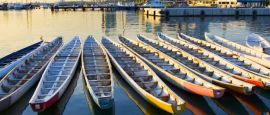Philippines: Doing business & staying in touch
Doing business in Philippines
The weather is almost uniformly warm and humid and so a shirt with a tie can be worn for business visits. Formal wear for Filipino men includes the barong tagalog (a long shirt made from pineapple fibres), which is not tucked into trousers.
Filipinos have an American business style and English is widely spoken. The best months for business visits are October to November and January to May. Unless you have urgent business matters to attend to, business visits around Christmas and Easter are not recommended as delays tend to be unavoidable.
The agricultural sector produces rice, corn, coconuts, copra, sugar cane and bananas as the main crops. The export of timber has been suspended since 1989 due to deforestation; at the start of 2011 a new law banned all logging other than in plantations. There is a modest mining industry and offshore oil. Most recent economic development has been industrial.
Financial incentives to attract foreign capital and the creation of export processing zones prompted strong growth during the early and mid 1990s. However, it also produced a skewed economy which is dominated by Manila.
Following a substantial slump in 1997, the economy recovered and was been less severely affected by the 2008 financial crisis than many of its neighbours. In 2015, growth was 6.6% and inflation 1.4%. Unemployment was at 6.4%. The Philippines belongs to the Association of South-East Asian Nations and the Asian Development Bank.
The Tourism Promotions Board provides information, assistance and guidance to meeting planners and incentive travel organizers. Popular locations for conferences and conventions are the Philippine International Convention Centre and the World Trade Centre.
Electronic products, raw materials such as iron, machinery and transport equipment, grains and fuels.
Keeping in Touch in Philippines
Mobile phone coverage is good, other than in mountainous areas and remote locations. There is 3G coverage in many urban areas. Roaming agreements exist with international mobile phone companies, but it is cheap and easy to buy a local SIM card. Credit top-ups (known as ‘load’) are readily available. International calls can be made on mobile phones, but the cheapest way is through a VOIP service. Software and headsets are available in most Internet cafés.
Internet cafés are common across the country. Access is cheap and usually reasonably fast. Wi-Fi is also usually easy to find, available in many hotels and coffee shops. The main telecoms companies offer reasonably priced 3G access via smartphones or USB dongles.
The media is controlled by powerful commercial interests. There is a busy TV scene, which is dominated by free-to-air networks ABS-CBN and GMA. Many radio networks are also run by TV broadcasters. Freedom of the press is guaranteed under the 1987 constitution, but it is not uncommon for controversial journalists to be murdered and the country has a poor track record for solving such crimes.








 You know where
You know where